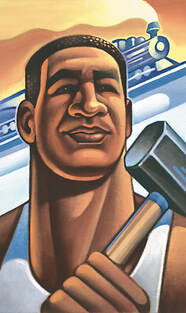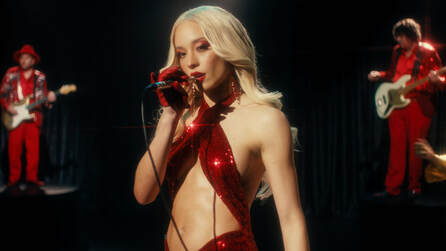|
Plath's early work, prior to 1956, gives very little indication of the dynamic poetic genius she would later unleash on the world. That said, there's one poem, "Sonnet to Satan," that really stands out and shows just about all of the elements that Plath would ultimately use to construct masterpieces.
There's a lot going on in this poem, but the first and most obvious element is, of course: surprise. A general rule of thumb with Plath is, if the poem doesn't start with a surprise, it probably won't be a very good Plath poem. Most, if not all, of her best poems like "Daddy," "Ariel," "Lady Lazarus," "Candles," and the like are based on hitting the reader where they least expect it. Here, in her college years, Plath decided to shock the grown-ups by writing a poem to Lucifer. What's even more shocking is she chose to do so in a sonnet. A demanding, exacting form that moves fast and demands facing contradictions, and immersing in often violently contrasting emotions. In other words, the definition of a Plath poem. Note two additional fingerprints: an almost-rigid attention to meter and a bold identification with myth. These are elements that Plath uses in all of her best work. Later, when she learns to fuse myth with the elements of her personal life, we'll see how and why her contribution to Confessionalism is different (and more important) than Sexton's or Lowell's though they also combined myth with personal experience. The first lines of the poem are bangers and show us a lot about Plath's poetic identity: In darkroom of your eye the moonly mind somersaults to counterfeit eclipse These are probably the best lines of the poem and also the lines that most clearly foreshadow the poet she would become. Strong verbs, bold metaphor, and an intense focus on psychological landscapes help Plath go straight inside Satan's head here, not to fix what ails him, but to see what's in there. The word "moonly" is brilliant and shows the witchy side of Plath that, like her mathematical mind, is more inborn than learned. Plath had a burning desire to see behind the veils of everything, including the devil. That's the most important thing to take away from this early gem. The thrill of the poem is not that she dared to write about the devil, but that she dared to go inside Lucifer's imagination. What she finds is order and pride. No-one, not even Dante or Milton, had gone quite that far, at least not while dressed in a schoolgirl's uniform, half-waiting to be a doctor's wife. Click the pic above and read the poem for yourself. See what you think of it and let me know. Next Monday, we'll take a look at "Black Rook in Rainy Weather" which is a poem that surprised Plath when she wrote it and changed the way she looked at poetry, and the world, for good. Meanwhile enjoy the full moon and consider listening to one of my new songs, linked below. I've been blowing off steam from writing by making music. Have a listen and leave a like or even subscribe to my YouTube channel! I recommend "Tornado Jam" which is a song I wrote about the tornado that ripped through our area a couple days ago. I made a cool video for it. Also, if you need a hand revising and /or polishing your poems. I've helped lots of poets. If you order in July, you'll get a free copy of my 7 Secrets of Poetry pdf!!!
0 Comments
AI is writing poems. Lots of poems. So many poems that the already overflowing sea of poetry on the Internet and elsewhere is the literary equivalent of Biblical deluge. Anyone can now write a poem literally just by tapping their finger. Sure, the poems (for now) aren't very good. And, sure, they are brazen pastiches of copyright trampled "samples" based on wiki-prosody and plebian twangs. But AI is only going to get better. I have a lot of thoughts about this, but right now, I want to know what you think. Do you fear AI? Do you use AI for writing? Do you scoff at the idea? For now, I'll just say this... I watched this happen with chess. One day people were laughing at computers, next thing you know, the ten best players in the world combined, led by Magnus Carlsen, would be lucky to even survive a middle game against super-crushers like Leela and Stockfish. Carlsen is the highest rated player in history at 2800, while Stockfish is rated at 3600. A human being will never beat the best AI at chess. Never. But imagining that it could happen would make a great story! Or even a poem. And, so far, no AI could have thought of that. If you click the John Henry portrait up top, you'll see how I've been leaning on AI creatively. No "tally" because I'm taking a quick break from poetry to work on music. Please take a moment to check out my new song "Wyld Heart" over at YouTube. Or click over to my Soundcloud page! Categories All When you write a poem, you're confiding your secrets to the whole world. The best poets do this with a kind of confidence that isn't easily explained. You can't fake it, copy it, or buy it. It's an art that one learns to master over time. Nobody spills out of the womb ready to write "Lady Lazarus" or "Howl." It takes sacrifice, dedication, and the willingness to grow through pain and disappointment. But most of all, it takes the ability to express your feelings freely, with aplomb and artistry. I'd like to shift gears for just a second in this context and talk about music. If you click the picture above, you'll go to a link to a performance by a three-piece pop band called Cannons. The video is from before they signed with a major label. I want you to pay particular attention to the lead singer, Michelle Joy. In this clip, her angelic voice is clearly stunning, but the confidence I'm talking about is not-quite-born. Now check out a second clip, (button below) from just a few months ago, where you can see her confidence in full-force, playing a new song in front of a live audience. And to polish it off, check out the third clip (button below) from a pro-video after the band was signed. What you're seeing is not only the emergence of a full-fledged artist. No doubt the usual grind and heartache that goes with any touring band is partially responsible for her breakthrough but I also think she is conscious of the alchemy that her band currently enjoys and is throttling at max watching the hourglass drip its sands. It's inspiring. Tally Poems Written: 294 Submission Tally: 47 Rejections: 17 (10 tiered) Acceptances: 0 Poem written today: "Bosses" Categories All |



